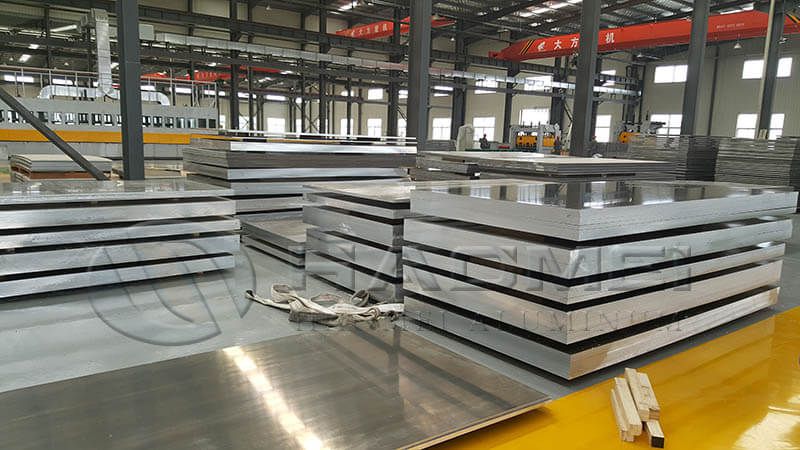Why Are 1/4 and 1/8 Aluminum Sheets Preferred
Oct 31 25
When it comes to foreign aluminum sheet procurement, 1/4-inch (approximately 6.35mm) and 1/8-inch (approximately 3.175mm) thicknesses consistently rank at the top, even becoming the "default" option in fields like construction, transportation, and industry.

Applications
1/8 aluminum sheet
The RV and yacht manufacturing industries are well-developed abroad, and these products are weight-sensitive. Excessive weight increases fuel consumption and sailing resistance, while too thin offers little protection against turbulence and wind erosion.
1 8 aluminum sheet meets the structural requirements of RV exteriors and yacht interior panels while keeping weight within a reasonable range. For example, the classic American RV brand Winnebago has long used 1/8 aluminum sheet for its sidewalls, achieving a balance between impact resistance and fuel economy.
1/8 aluminum sheet is also commonly used in foreign home DIY projects and small-scale architectural decorations (such as outdoor awnings and wall panels). Its moderate thickness makes it easy to transport and allows for direct installation after cutting, eliminating the need for complex reinforcement.
1/4 aluminum sheet
For applications requiring load-bearing or wear resistance, 1 4 aluminum plate offers sufficient strength without the material waste associated with excessive thickness. For example, protective panels for European industrial equipment and supports for North American warehouse shelving can withstand vibration and cargo compression while reducing material costs by 20%-30% compared to thicker 3/8 aluminum sheet.
In the construction sector, 1/4 aluminum sheet is also commonly used as a base for roof waterproofing and curtain wall support structures in low-rise residential buildings abroad. It offers corrosion resistance and requires no additional load-bearing structures for installation.
Cost and efficiency
Procurement and transportation
For every 0.5mm increase in aluminum sheet thickness, the unit weight increases by approximately 1.35kg/㎡, leading to increased packaging, storage space, and logistics costs during transportation. 1/8 and 1/4 aluminum sheet thicknesses minimize transportation costs while still meeting demand.
Installation
Labor costs are high abroad, and installation efficiency directly impacts project budgets. 1/8 aluminum sheets are lightweight (approximately 8.1 kg/m2) and can be manually handled and installed by two to three people, eliminating the need for large lifting equipment. While slightly heavier (approximately 16.2 kg/m2), 1/4 aluminum sheets can be secured with a standard electric drill and rivet gun, eliminating the need for specialized heavy tools for thicker sheets. Thicker sheets, by contrast, require renting a crane and customizing mounting hardware, increasing labor and equipment costs by over 50%. Therefore, 1/4 and 1/8 aluminum sheets are preferred for cost control.
Processing Compatibility
Most small-scale processing plants abroad use shearing and bending machines with a maximum processing thickness of less than 10mm. 1/4 aluminum sheet falls within this "high-efficiency processing range," achieving a cutting accuracy of ±0.1mm and resisting cracking during bending. 1/8 inch aluminum sheet offers greater flexibility and can even be manually bent into curved shapes (e.g., decorative moldings), making it suitable for customized orders (e.g., restaurant wall decorations, laboratory equipment housings).
Environmentally friendly and durable
During the aluminum sheet rolling process, thicker sheets require greater rolling pressure and higher energy consumption. The production energy consumption of 1/4 and 1/8 aluminum sheets is 25%-30% lower than that of 1/2 aluminum sheets, aligning with policies such as the EU's "Carbon Footprint Control" and the US's "Clean Power Plan." Purchasers can also receive environmental subsidies for using these materials as "low-energy materials."
Aluminum plates are inherently corrosion-resistant. 1/8 aluminum panels can last for more than 15 years when used outdoors (such as exterior wall decoration), and 1/4 aluminum panels can last up to 20 years (such as industrial supports). This perfectly matches the "long-term use, low maintenance" requirements of foreign projects.
https://www.alsheetplate.com/a/why-are-14-and-18-aluminum-sheets-preferred.html








